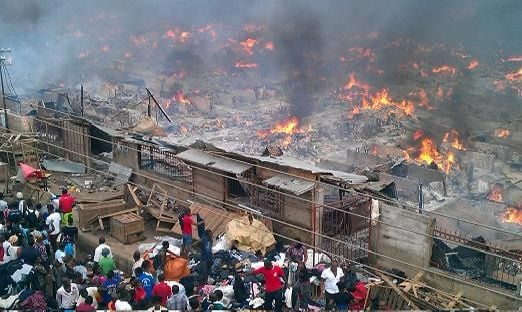The Greater Accra Regional Fire Commander, ACFO II Rashid Kwame Nisawu, has expressed deep concern over the increasing incidence of market fires in Ghana, attributing this worrying trend to the misuse of market spaces and unsafe storage practices of flammable materials. He highlighted the critical issue of traders using markets as residential areas, a practice that significantly elevates the risk of fire outbreaks. Vendors often resort to using open flames for lighting, cooking, or repelling insects, especially during power outages, creating hazardous conditions within the crowded and often poorly ventilated market environments. These seemingly innocuous actions, coupled with the presence of flammable goods, create a perfect storm for devastating fires.
ACFO II Nisawu stressed the importance of maintaining clear boundaries between commercial and residential activities within market spaces. He emphasized that markets should be exclusively designated for trading purposes, and activities such as cooking, sleeping, and bathing should be strictly prohibited. The blurring of these lines, where traders transform market stalls into makeshift living quarters, introduces a multitude of fire hazards, ranging from unattended cooking fires and open flames to the use of electrical appliances in unsafe conditions. The inherent risks associated with these practices are magnified by the density of goods and the often-chaotic layout of many markets, making it difficult to contain fires once they ignite.
The Fire Commander’s remarks underscored the need for a comprehensive and proactive approach to fire safety in markets. This involves not just enforcing regulations against residential use but also implementing stringent measures for the safe storage and handling of flammable materials. Many market traders deal in highly combustible items, such as textiles, plastics, and foodstuffs, which require careful management to mitigate fire risks. Improper storage practices, including stacking these goods too high or close to potential ignition sources, amplify the potential for rapid fire spread. Furthermore, inadequate ventilation within market stalls can exacerbate the intensity of fires by limiting the escape of heat and smoke.
Effective fire safety in markets necessitates a multi-pronged strategy that encompasses education, enforcement, and infrastructure improvements. Market traders need to be educated about fire hazards, safe storage practices, and the importance of adhering to fire safety regulations. Regular fire safety inspections and stringent enforcement of existing rules against residential use and improper storage of flammable materials are crucial. Investing in fire-resistant building materials and upgrading market infrastructure to include fire suppression systems, such as sprinklers and fire extinguishers, could significantly reduce the impact of potential fires. Creating clear evacuation routes and conducting regular fire drills can also help ensure the safety of traders and customers in the event of a fire.
Beyond the immediate concern of preventing fires, the issue of traders residing in markets also raises broader societal questions about affordable housing and economic disparities. The fact that vendors feel compelled to live in their stalls suggests a lack of access to affordable and safe housing options. Addressing this underlying issue requires a holistic approach involving government initiatives, community support, and potentially collaborations with private sector organizations to provide adequate and affordable housing solutions for market traders. This would not only improve their living conditions but also contribute significantly to enhancing fire safety within market environments.
In conclusion, the rising incidence of market fires demands immediate attention and a coordinated response. By strictly enforcing regulations against residential use, implementing robust fire safety measures, educating traders about fire prevention, and addressing the underlying socio-economic factors that contribute to this problem, Ghana can significantly reduce the risk of these devastating incidents and create safer, more secure market environments for both traders and consumers. The Fire Commander’s warning serves as a crucial reminder of the importance of proactive fire safety measures and the need for a comprehensive approach to mitigate this growing threat to livelihoods and economic stability.


